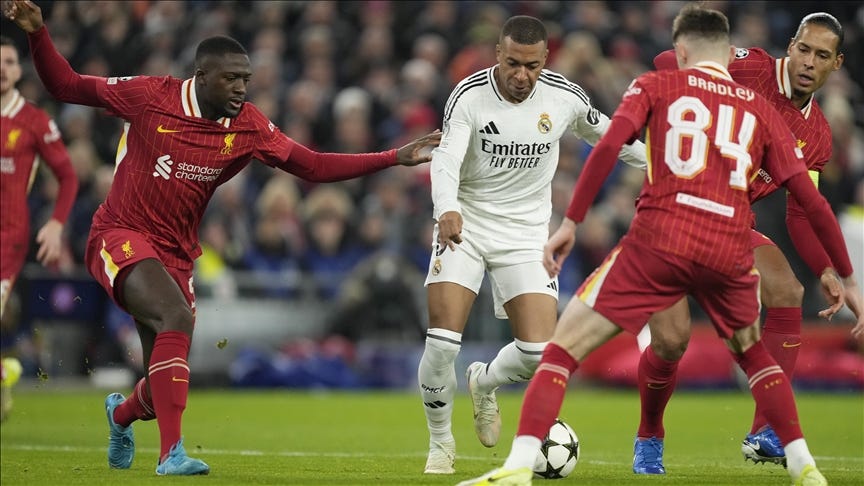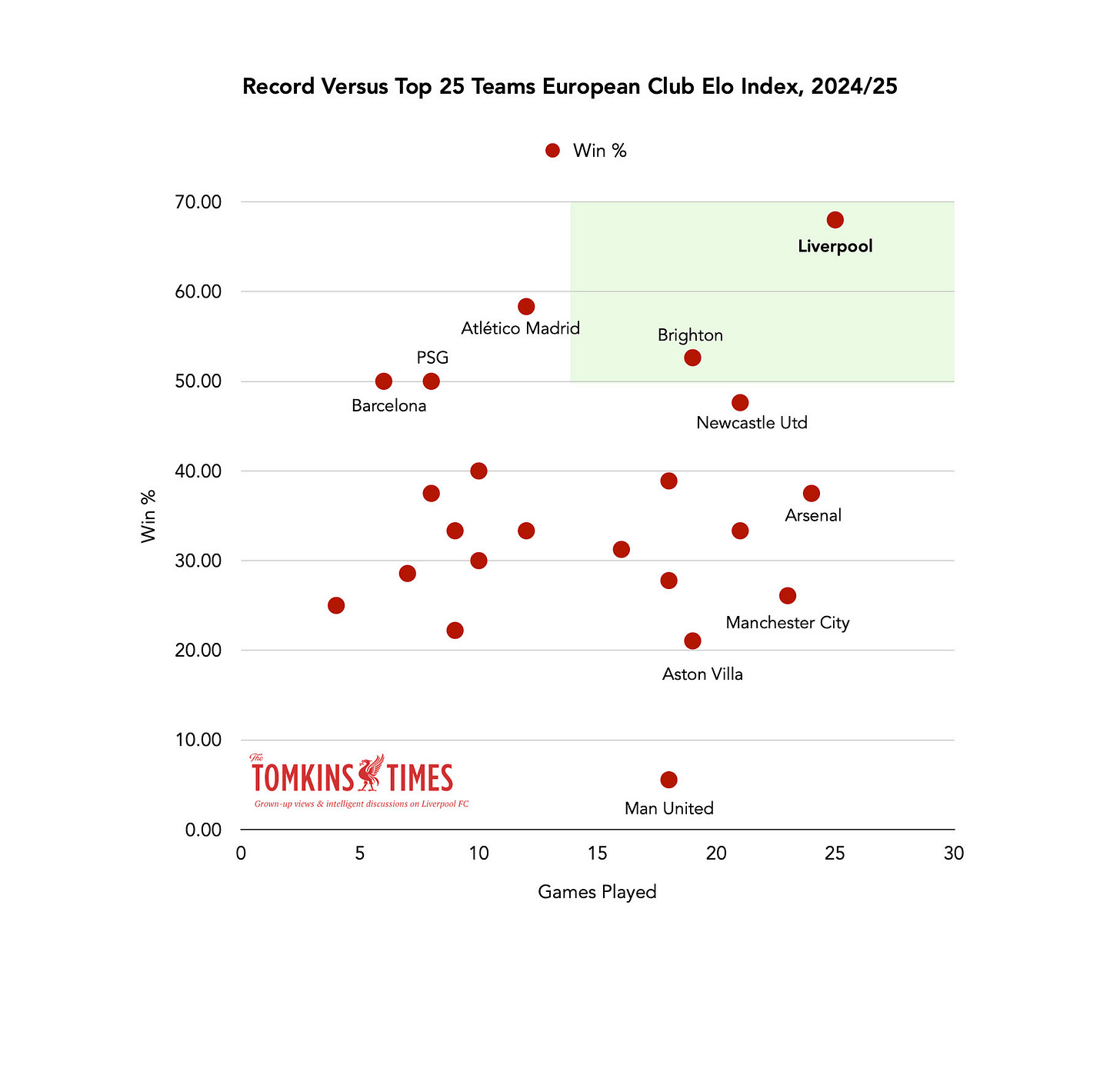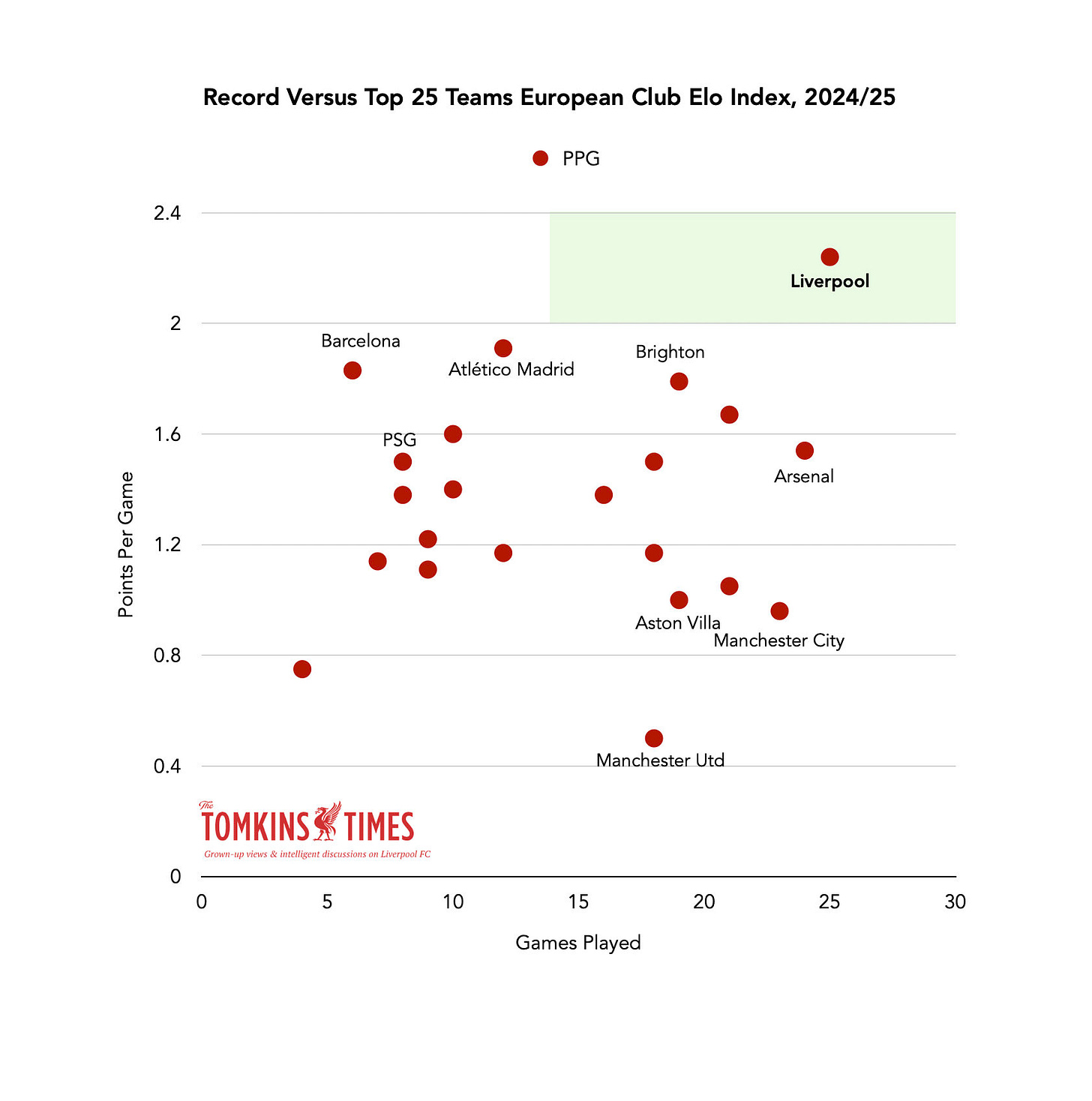The European 'Ultra League' – Europe’s Top 25 Ranked Sides vs Other Top 25 Ranked Sides
A 'Super League' table of the best 25 vs the best 25
Looking at when the best teams played the other best teams
If you look at the latest European Club Elo Index top 25, a staggering 12 of 25 are from the Premier League. Almost half the best teams in Europe are English.
The Elo is a ranking system that weights results based on opposition strength.
In the top 25 there are just two teams from Germany (Dortmund are just outside due to poor domestic form that sees them 10th in the Bundesliga), two from France. A handful more from Spain and Italy. That’s it.
In the constant stream of nonsense designed to denigrate Liverpool’s achievements this season, it’s worth noting that no one has played more than the Reds’ 25 games against the other 24 teams in the top 25. (The average is 14.04 games.)
Yet there is not a single metric, in total games, or on averages, where Liverpool do not come out as the best team in these head-to-head games.
Total wins, xG Difference Per Game, Points Per Game, Win %. Liverpool top them all.
You could almost call this the Swiss system for a European Super League, and this is what you’d get.
Just behind Liverpool on games, Arsenal have played 24 – it’s worth noting how brutal the season in England is, if so many teams are also excellent, as well as physically fast and strong.
For instance, excluding all types of showpiece games (Community Shield, Super Cups, etc), Barcelona have played just six games against the best 25, and PSG just eight.
Obviously they can’t play the Premier League teams every week. But Liverpool have to. And Liverpool have faced better teams in Europe.
Barça played Atalanta and Bayern Munich from the 25; Liverpool have faced Real Madrid, Lille, Leverkusen, Paris S-G and Paris S-G again.
Barça finished 2nd in the group, and were drawn against the team currently ranked 32nd; Liverpool won the group and faced the team currently ranked 4th. How’s that for luck?!
PSG faced six of the top 25 in the Champions League, with four in the group stage; explaining why they finished so low, compared to a team like Barça, who played only two of the top 25.
But in France, just Lille twice. They faced Brest in the knockout round, and Brest are ranked 64th. They beat them 7-0, as you might expect. Lyon are ranked the 3rd-best French team, in 36th place.
Indeed, Fulham and Brentford rank above them, meaning that there are 14 Premier League teams who rank higher than the 3rd-best French team.
PSG can conserve energy, and they have the finances to ‘own’ that league. Anyone else has good players? Thank you very much!
Yet PSG still won only half of their eight matches against the best 25 teams in Europe. They were fresher and faster than Liverpool, no doubt. Liverpool rode their luck in Paris, and PSG, though good on the break, got very lucky at Anfield (blocks on the line, Liverpool hitting woodwork, lucky ricochet for the early goal against the run of play, winning every single coin toss).
Being better against the best teams is only part of the equation, but this notion, heard for so long this season, that “Liverpool haven’t played anyone good yet”, is as fatuous as it gets.
They’ve played more top 25 teams than anyone in Europe, and play one more tomorrow at Wembley. (Arsenal play another, versus Chelsea.)
Interestingly, Brighton come out of it extremely well, and Newcastle also. Manchester United come out the worst, with just one win in their 18 games, or a 5.6% win rate. Real Sociedad, who they just beat, rank 53rd in the Club Elo Index.
It’s not that Liverpool have been the best team in Europe this season, but they are almost off the charts.
So, as an interlude, look at the charts, for win%, xG Difference and points per game:
(Points per game applied to cup games too.)
Then, just outright wins, which obviously is affected by the number of games played, but even so:
This is a lot of games against top teams, and a lot of wins. As noted, tomorrow will bring another. It seems that Newcastle and Brighton are actually specialists against good teams, and less good against the rest.
I’ve spoken for a few years about Density and Intensity.
How the more tough games you have in a shorter period of time, the harder it is to win at a normal rate, and the greater the collateral damage, with fatigue, injuries and lack of preparation time.
Over a shorter, medium and longer period of time, it all adds up. I’ve called it Cumulative Effort.
One of the reasons you get breakout stories like Brendan Rodgers’ Liverpool in 2013/14, Leicester in 2015/16 and even Notts Forest this season, is the lack of European games and long cup runs. (It doesn’t explain it all, obviously. Forest are still in the FA Cup, but have played only four cup games this season.) There’s less Cumulative Effort required.
Contrast that with the Cumulative Effort Liverpool had in a single week when facing Real Madrid, Man City and Newcastle. This season has been one big bag of Cumulative Effort. Before PSG it was five league games in 15 days, three away.
And the Premier League itself is increasingly Dense and Intense, with no winter break this year (and still two domestic cups), and ultra-fit and strong sides that take you the full 90 minutes.
This excludes the bottom three, who like in other recent seasons, remain largely shite, in part as the rest are so far ahead now that it’s a tough ask to come up and not be cannon fodder.
Remember, the 25 ‘Top 25’ games Liverpool played does not include the absolute madness of the Goodison derby, nor playing Fulham with 10 men for 90 actual game minutes, nor the wins against Brentford home and away. Liverpool’s derby is unique, as Everton aren’t very good, but they are ultra-aggressive at Goodison with permissive refs scared by the noise. It also doesn’t include recent trophy winners West Ham, whom Liverpool beat 5-0 away.
(And Wolves’ squad would have them top four in most countries. Arsenal drew with Everton, and recently lost to West Ham, who are in the Euro Top 50.)
The notion that PSG, who genuinely have hardly played anyone good this season outside a handful of European games, are so much better than Liverpool because they were better in one week in mid-March 2025 ignores what a season actually is.
It was Liverpool’s 25th game against top opposition, three times as many as PSG had faced. That seems perfect for springtime peaking, which you cannot do in England unless you want to start from 15 points behind the pack.
Which isn’t to say that PSG were not excellent, as they were: lots of very expensive players coming together in Luis Enrique’s second season, with more pace in an XI than I can remember seeing before. They look like a superb team, but a hollow, soulless club in a farmer’s league that they’ve helped ruin.
Arsenal are way behind Liverpool against good opposition, winning roughly half as many of their games: 37.5% vs 68.0%. They average just +0.16 xG Difference per game, which is way down on Liverpool’s +1.09.
The excellent Hamzah Khalique-Loonat showed in the Times that, in general, Arsenal are too risk averse and worse than Liverpool in every game-state for creating open-play xG. Liverpool’s rank top when losing … and top when drawing … and top when winning.
(Arsenal’s poor metrics should not detract from how good Liverpool are!)
Liverpool, who also obviously have a very good record against the worst teams, are the opposite of flat-track bullies.
Generally, the better the opposition, the more impressive they’ve been. And Liverpool have done all this while generally being uncharacteristically shit at attacking set-pieces, in part as Arne Slot’s set-piece coach was denied a visa.
I don’t expect trolls and banter-wankers on the internet or TalkSport to appreciate this, but any normal journalist who says anything to the contrary of what’s stated in this piece is stealing a living.
Arguably, the Premier League has never been stronger. And so Liverpool being top of arguably the strongest-ever Premier League is somehow … not that impressive? Really? Aren’t you talking out of your arse to suggest as much?
Even Pep Guardiola says that the league now is much stronger than when he arrived (and I recently pointed out that only a handful of English clubs were in the top 25 in 2016, so it’s roughly doubled in nine years), saying:
“Teams had to go to the [transfer] markets and that helps people. People want to do good, people are well organised, have good structures, good decisions, good players everywhere.
“I’ve been here when I went to Bournemouth in the beginning, and now it’s different. And when I went in the beginning in Brighton, and now it’s different. And when I went in Fulham in the beginning, and now it's different.
“I’m an old guy, I’m the oldest [longest] manager here, nine years. So I know the evolution of the Premier League has been massive.”
I’m not saying that this Liverpool team is as good as the best teams Europe has ever seen, but the data shows that the Reds are not far behind many of the best title winners who didn’t also win the Champions League in the same season (and few of those won eight of ten games in Europe’s top competition).
Liverpool are certainly better than many English champions in the Premier League era, and a few more wins could seal the title well before the final game. They have the best underlying numbers, as well as the best results, in general, and against the other best 25 teams in Europe.
This article also shows that Newcastle are very good against good teams, so that’s a warning for tomorrow, too.
This is *another* free read, as I rail against the mass stupidity of punditry. But I’ll be back to paywalled pieces ASAP. Commenting is always for paying subscribers only.
Keep reading with a 7-day free trial
Subscribe to The Tomkins Times - Main Hub to keep reading this post and get 7 days of free access to the full post archives.










